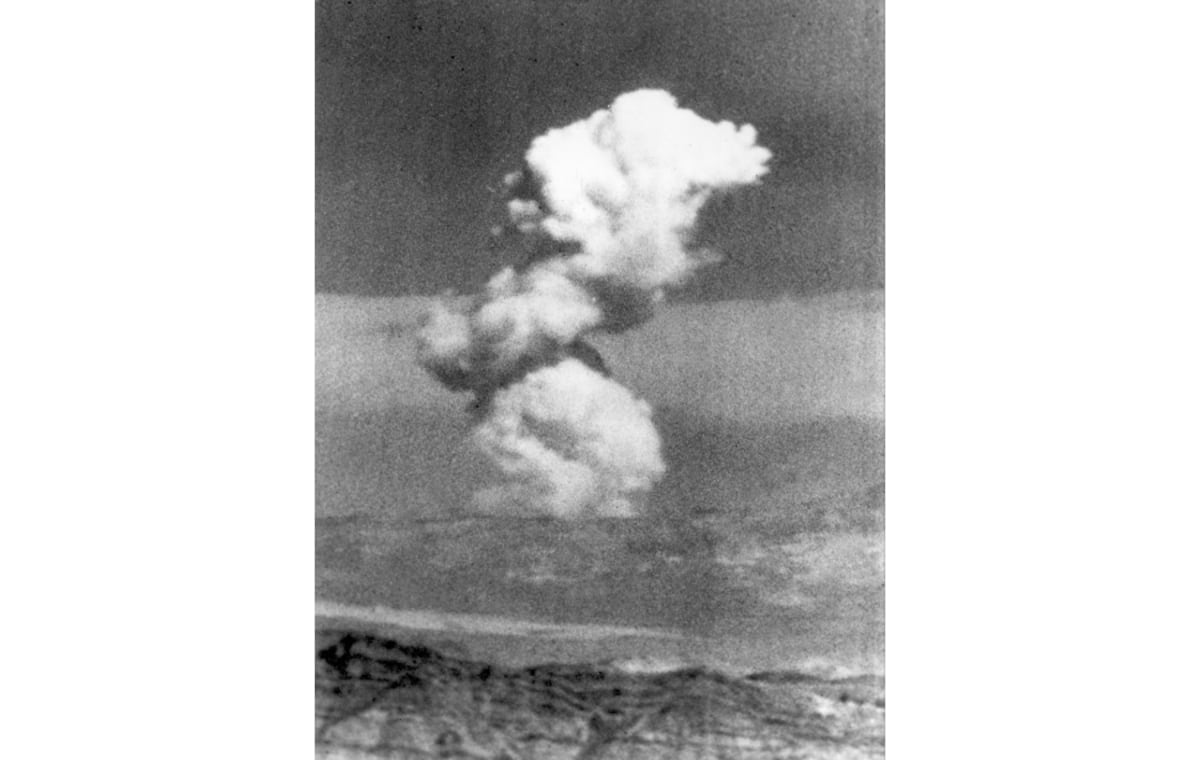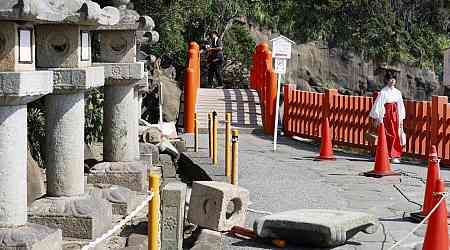Two months after the expiration of a program to compensate victims of radioactive fallout from nuclear weapons testing during the Cold War, the prospects for reviving it seem to be fading fast.
Missouri Republican Sen. Josh Hawley’s bill to extend and expand the Radiation Exposure Compensation Act passed the U.S. Senate by a strong bipartisan 69-30 vote in March but remains stuck in the House of Representatives, where Republican House Speaker Mike Johnson will not allow a vote on the legislation.
Moreover, Congress is in recess in August through the first week of September, and victims of radioactive fallout — often referred to as “downwinders” — and their supporters are uncertain what might be in play to bring RECA back.
“We intend to keep on fighting to ensure we don’t just extend the RECA program, but also ensure it is strengthened to cover people who have been excluded so far,” said Lily Adams, senior outreach coordinator with the Union of Concerned Scientists, one of several organizations working to revive and reform the program former U.S. Sen. Orrin Hatch helped enact in 1990 to compensate fallout victims suffering from various forms of cancer.
Coverage versus cost
RECA lapsed on June 10 after Congress failed to expand or even extend it. The program covered residents who lived in Beaver, Garfield, Iron, Kane, Millard, Piute, San Juan, Sevier, Washington and Wayne counties for two consecutive years from 1951 to 1958, or July 1962, when several powerful atomic bombs were detonated in Nevada.
Northern Utah residents and others living in the fallout zone were not eligible for compensation, even though a recent Princeton University study found radioactive contamination from nuclear explosions conducted in New Mexico and Nevada between 1945 and 1962 spread to 46 of the U.S.’s lower 48 states, as well as to Canada and Mexico.
In March, it looked like RECA might have been handed a lifeline with the Senate’s passage of Hawley’s bill, which would have extended the program by six years and expanded coverage to previously excluded residents of Utah, Nevada and Arizona.
In addition, the bill would expand coverage to eligible residents in Alaska, Colorado, Idaho, Kentucky, Missouri, Montana, Tennessee and the U.S. territory of Guam. It would also double payouts to nuclear fallout victims from $50,000 to $100,000 and extend coverage to uranium miners exposed to harmful radiation in the mines until 1990, nearly two decades longer than RECA’s 1971 timeframe.
Alas, Sens. Mike Lee, Mitt Romney and other members of Utah’s congressional delegation refused to support the bill, decrying the bill’s $50 billion price tag and opting instead to push for a two-year expansion. Expanding RECA and its coverage, they argued further, was not supported by science and would put the program at risk.
“I was proud to reauthorize RECA in 2022 and introduce the Downwinders Act to extend protections for Utahns who were harmed by atomic testing,” Lee told The Salt Lake Tribune via email. “The particular expansion of RECA passed on March 7, however, stretches the program to include wide geographic areas it was not intended to cover, without sufficient data, and would spend an additional $50 billion in taxpayer dollars without a pay-for to offset the cost to American taxpayers.”
Lee and Utah Rep. Celeste Maloy floated their own bill to extend RECA two years but not expand the program, which quickly sank after Hawley and GOP Missouri Rep. Ann Wagner pronounced their effort “dead on arrival.”
As a compromise, according to Lee spokesperson Bill Gribbin, Utah’s senior senator introduced a bill in May that would expand compensation for all of Utah, and to some parts of New Mexico and Missouri. It also failed to muster much support.
“Sen. Hawley objected to passing both Lee proposals by unanimous consent, preferring to make his bill as the only option for the House to consider,” Gribbin told The Tribune via email. “Sen. Lee remains committed to working to reauthorize RECA, and hopes that his colleague will allow that to happen.”
In refusing to allow the House to vote on the Hawley bill, Johnson also took issue with its cost, noting there was no offset for its $50 billion price tag. Other factors, according to Johnson spokesperson Taylor Haulsee, include the Senate asking the House to bypass committees to put Hawley’s bill straight to the floor and the fact that 29 GOP senators opposed the bill despite its passage in the Senate.
“House Republican Leadership is sympathetic to radiation advocates but feels we need to respond in a responsible way,” Haulsee said in an email.
Given the impasse, the House allowed RECA to expire. For his part, Hawley argues congressional inaction is unacceptable.
“The Senate has done its job and reauthorized RECA — months ago,” he said. “But the House and Mike Johnson sat around and allowed countless Americans to lose coverage. Now Speaker Johnson must schedule RECA for a vote as soon as the House returns in September. Lives depend on it.”
Assessing blame, taking stock
In assessing blame, downwinders and supporting organizations are clear about which side of the divide they take. They blame the GOP House leadership in general, and members of the Utah delegation in particular, for not getting on board with Hawley’s bipartisan bill.
Adams noted Congress has spent trillions of dollars on developing nuclear weapons and should make it a priority, as part of the cost of that development, to fund programs that help the victims of radioactive fallout.
“Seeing the resistance from members … of the Utah congressional delegation to [Hawley’s] bill is not helpful because if they were more supportive, it would make it easier for Mike Johnson to bring up the bill for a vote,” Adams said, adding the program needs to be expanded and extended.
“To merely extend the program,” she continued, “is really just extending an existing injustice because it leaves out all these communities that have been fighting for decades for coverage [under the RECA program.]”
Laura Taylor, an Arizona attorney who handles RECA claims, said she was a “lone wolf” among RECA supporters in that she was pushing to extend the program first before addressing the need for expansion.
“But overall, the group thought it was all or nothing at this point,” she said. “So now we have nothing and we are still working on all.”
While RECA’s fate remains uncertain, Taylor said the U.S. Department of Justice has its hands full processing claims because the number of applications for compensation shot up from 260 a year ago last June to more than 1,040 this June before the program expired.
“People used to be able to submit a claim and get approval within two weeks …,” she said. “Now it’s going to probably take them a solid nine to 12 months to process all those claims.”
As for RECA, supporters say there might be an opportunity to get an expanded version of the program inserted into a continuing resolution for Congress to vote on in September. Another option might be to secure a vote for reauthorization during the lame-duck session after the November elections.
Maloy’s office remains optimistic that the program is not “permanently” dead and that a deal will get done. If it doesn’t, they say the blame lies elsewhere.
“Members of the Missouri delegation decided to hold up RECA renewal to try to force concessions for their state, concessions that do not fit under the original act’s purview,” Maloy’s office said in an email. “We have been against that strategy from the beginning for fear it would lead to exactly this outcome, and we deeply regret that our Missouri colleagues would play political games with such an important benefit to southern Utah’s downwinders.”
For her part, Taylor is less optimistic.
“If we don’t get [RECA] passed or expanded by the end of the year,” she said, “I think it’s not going to happen.”
As of July 2023, the government has paid $2.6 billion to about 40,000 radiation victims.
function onSignUp() { const token = grecaptcha.getResponse(); if (!token) { alert("Please verify the reCAPTCHA!"); } else { axios .post( "https://8c0ug47jei.execute-api.us-east-1.amazonaws.com/dev/newsletter/checkCaptcha", { token, env: "PROD", } ) .then(({ data: { message } }) => { console.log(message); if (message === "Human





























